Gadget Pilipinas | Tech News, Reviews, Benchmarks and Build Guides
Intel Core i7 10700 Review – Performance On A Budget
Introduction – Intel’s 14nm Journey
Intel’s 10th generation processors still sport a 14nm process which has been around since Intel 6th gen Skylake. There’s a variety of SKUs for the 10th Gen Core lineup starting from $122 with the i3-10100, to the flagship i9-10900k at $488. All CPUs under the core series now have hyperthreading regardless of pricing and tiering. There are seventeen SKUs available at launch, with most models having an “F” version. The letter F next to the processor number means that that particular CPU doesn’t have the built-in integrated graphics of their no-letter counterparts. These processors are $15 cheaper on average compared to their non-F counterparts, K-series, or overclockable chipsets included. While we already reviewed the Intel Core i7 10700k at launch, we’re taking a look at the budget-friendly Intel Core i7 10700 locked variant for users who just want a plug-and-play experience for their gaming rigs. Launched last 2020, the Intel Core i7 10700 still boasts a heavy presence in the market in the form of prebuilt partner PCs and desktop packages. Having aged a year also means that owners of these rigs are looking for the latest GPUs to pair with their i7 10700. That said, is the Core i7 10700 still relevant in today’s games and hardware pairing? Let’s find out
Intel 10th Gen Comet Lake-S Overview
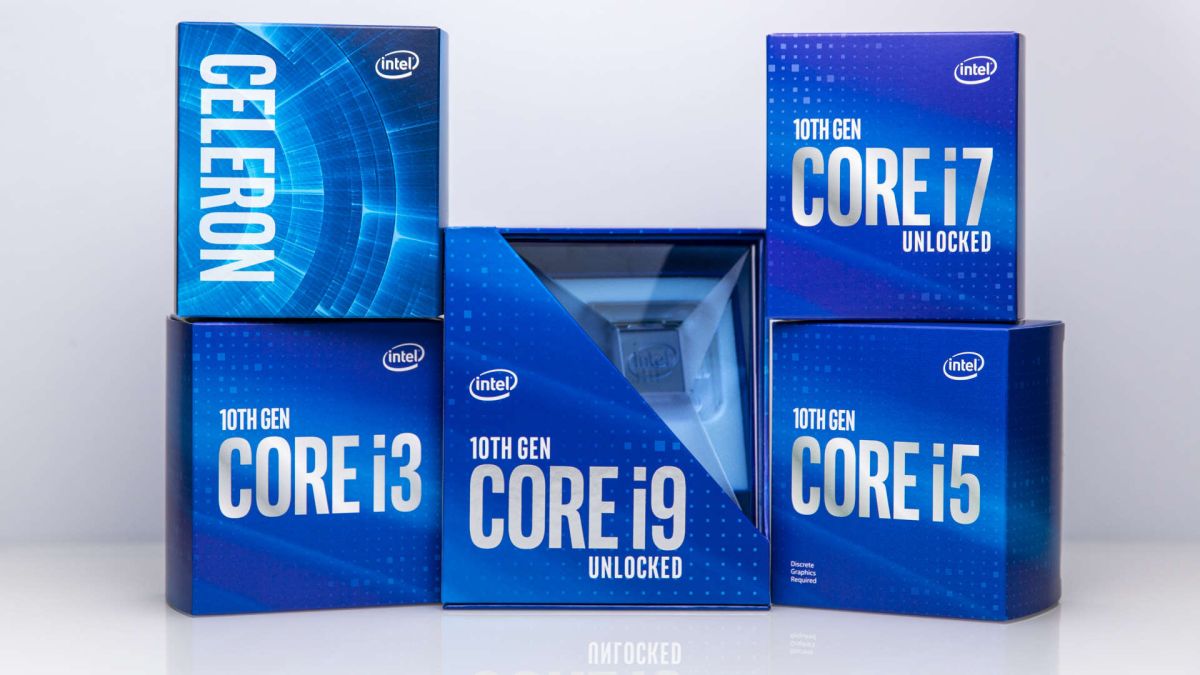 Intel has aggressively beefed up its lineup by adding more cores and effectively enabling hyperthreading across its product stacks. Core i3 CPUs run now have 4-cores/8-threads but are not overclockable. The i5 processors sport a 6-core/12-thread setup with two K-SKUs ready for overclocking, one of which has no integrated graphics. All Core i7 SKUs are multi-threaded octa-core CPUs while the flagship Intel Core i9 Series has a 10-core/20-thread setup. The additional core count offered by AMD reflects AMD’s aggressive multicore approach, which has been team red’s highlight even before Ryzen. Intel’s 10th-gen 10-core i9 CPUs still lags behind in the mainstream line as AMD offers a twelve and sixteen core processor. However, the other SKUs match the competitors offering in terms of core count, particularly those below the $350 mark.
Intel has aggressively beefed up its lineup by adding more cores and effectively enabling hyperthreading across its product stacks. Core i3 CPUs run now have 4-cores/8-threads but are not overclockable. The i5 processors sport a 6-core/12-thread setup with two K-SKUs ready for overclocking, one of which has no integrated graphics. All Core i7 SKUs are multi-threaded octa-core CPUs while the flagship Intel Core i9 Series has a 10-core/20-thread setup. The additional core count offered by AMD reflects AMD’s aggressive multicore approach, which has been team red’s highlight even before Ryzen. Intel’s 10th-gen 10-core i9 CPUs still lags behind in the mainstream line as AMD offers a twelve and sixteen core processor. However, the other SKUs match the competitors offering in terms of core count, particularly those below the $350 mark.
Intel 10th Generation Processors Spec Sheet
| SKU | Cores / Threads | Base Clock | Turbo Boost 2.0 | Turbo Boost Max 3.0 | All Core Turbo | Thermal Velocity Boost/All Core | TDP | SRP (USD) |
|---|---|---|---|---|---|---|---|---|
| i9-10900K | 10C/20T | 3.7 GHz | 5.1 GHz | 5.2 GHz | 4.8 GHz | 5.3/4.9 GHz | 125W | $488 |
| i9-10900KF | 10C/20T | 3.7 GHz | 5.1 GHz | 5.2 GHz | 4.8 GHz | 5.3/4.9 GHz | 125W | $472 |
| i9-10900 | 10C/20T | 2.8 GHz | 5.0 GHz | 5.1 GHz | 4.5 GHz | 5.2/4.6 GHz | 65W | $439 |
| i9-10900F | 10C/20T | 2.8 GHz | 5.0 GHz | 5.1 GHz | 4.5 GHz | 5.2/4.6 GHz | 65W | $422 |
| i7-10700K | 8C/16T | 3.8 GHz | 5.0 GHz | 5.1 GHz | 4.7 GHz | 125W | $374 | |
| i7-10700KF | 8C/16T | 3.8 GHz | 5.0 GHz | 5.1 GHz | 4.7 GHz | 125W | $349 | |
| i7-10700 | 8C/16T | 2.9 GHz | 4.7 GHz | 4.8 GHz | 4.6 GHz | 65W | $323 | |
| i7-10700F | 8C/16T | 2.9 GHz | 4.7 GHz | 4.8 GHz | 4.6 GHz | 65W | $298 | |
| i5-10600K | 6C/12T | 4.1 GHz | 4.8 GHz | 4.5 GHz | 125W | $262 | ||
| i5-10600KF | 6C/12T | 4.1 GHz | 4.8 GHz | 4.5 GHz | 125W | $237 | ||
| i5-10600 | 6C/12T | 3.3 GHz | 4.8 GHz | 4.4 GHz | 65W | $213 | ||
| i5-10500 | 6C/12T | 3.1 GHz | 4.5 GHz | 4.2 GHz | 65W | $192 | ||
| i5-10400 | 6C/12T | 2.9 GHz | 4.3 GHz | 4.0 GHz | 65W | $182 | ||
| i5-10400F | 6C/12T | 2.9 GHz | 4.3 GHz | 4.0 GHz | 65W | $157 | ||
| i3-10320 | 4C/8T | 3.8 GHz | 4.6 GHz | 4.4 GHz | 65W | $154 | ||
| i3-10300 | 4C/8T | 3.7 GHz | 4.4 GHz | 4.2 GHz | 65W | $143 | ||
| i3-10100 | 4C/8T | 3.6 GHz | 4.3 GHz | 4.1 GHz | 65W | $122 |
The spec sheet shows Intel’s Turbo Boost Max 3.0 technology as well as Thermal Velocity Boost, which are the highlights of Intel’s 10th generation Comet Lake processors. Turbo Boost Max 3.0 is present for a long time but was mostly found on HEDT processors that required driver and software downloads to enable it. Turbo Boost Max 3.0 selects the two fastest cores of a processor and assigns single or multi-threaded workloads to them. Depending on the processor, Turbo Boost Max 3.0 is faster than Thermal Velocity Boost.
Thermal Velocity Boost was first introduced in Intel Coffee Lake H mobile processors and is now carried over to Intel’s 10th gen desktop line, albeit as an exclusive feature of the 10th-gen Core i9 series. Thermal Velocity Boost is a similar and simpler feature of Nvidia’s GPU boost and AMD’s Precision Boost 2. Simpler meaning that it doesn’t have a smart scaling that depends on silicon lottery. TVB enables a processor to achieve a higher boost clock than Max Turbo Boost for a short period, or so long as the processor’s temperature doesn’t go over 70° celsius. That is if the processor is within Power Limit 2 and under TAU. TAU is Intel’s timing variable, which tells a processor how long it should be on PL2 mode before dropping to PL1.
Intel Core i7 10700
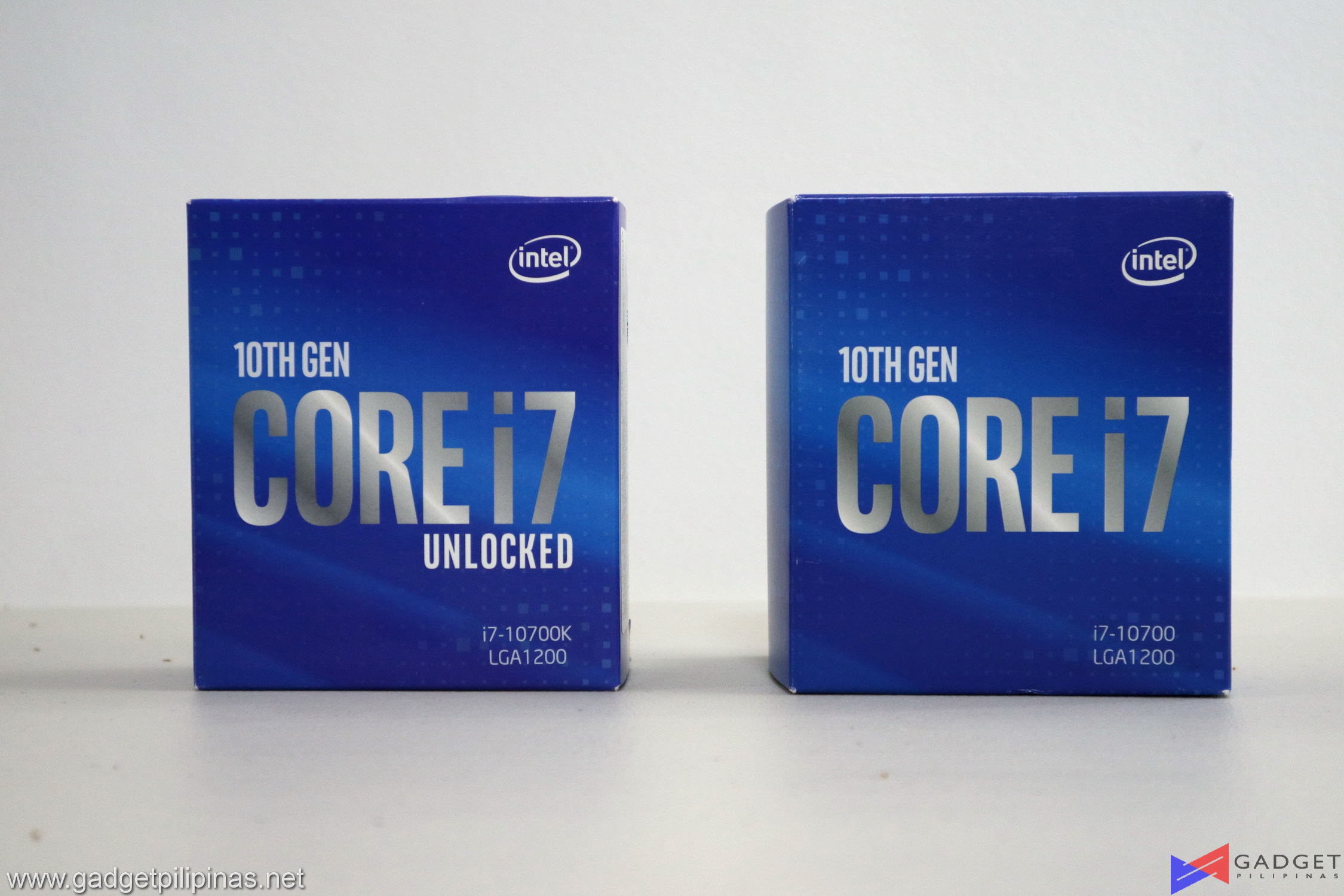 The Intel Core i7 10700 8-core CPU is the locked variant of the 10700K with reduced clockspeeds. While the Intel i7 10700 has a 1 GHz less base clock, it only has 100MHz less all-core turbo speeds than the overclockable variant. Being an i7 series processor, the Core i7 10700 supports Turbo Boost Max technology at 4.8Ghz for its two-best cores maximizing the processor’s performance for single and multi-threaded workloads despite being a locked variant.
The Intel Core i7 10700 8-core CPU is the locked variant of the 10700K with reduced clockspeeds. While the Intel i7 10700 has a 1 GHz less base clock, it only has 100MHz less all-core turbo speeds than the overclockable variant. Being an i7 series processor, the Core i7 10700 supports Turbo Boost Max technology at 4.8Ghz for its two-best cores maximizing the processor’s performance for single and multi-threaded workloads despite being a locked variant.
Benchmark Setup and Methodology
Gadget Pilipinas’ testing philosophy is to provide detail-oriented results as accurately as possible that our readers can replicate our tests given that these conditions are met. Different benchmarking apps and sequences are used depending on the component or device being tested.
| Intel Core i7 10700 Review Test Bench Specs | |||||
| CPU | Intel Core i7 10700 | Intel Core i9 10900K | AMD Ryzen 9 5900X | AMD Ryzen 9 5950X | AMD Ryzen 9 3900X |
| COOLER | Corsair H100i RGB PRO XT 240mm AIO – Noctua NT-H2 Thermal Paste | ||||
| MOTHERBOARD | ASUS ROG Strix Z490-E Gaming Motherboard | ASUS ROG Strix X570-E Gaming Motherboard | |||
| MEMORY | Tforce XTREEM ARGB 16GB(2x8GB) 3600Mhz DDR4 | ||||
| GPU | Inno3D GeForce RTX 3070 iChill X4 | ||||
| STORAGE | WD SN850 1TB SSD | ||||
| POWERSUPPLY | ThermalTake ToughPower 1200w Platinum | ||||
| OPERATING SYSTEM | Windows 10 Pro Build 2404 | ||||
| DISPLAY | Lenovo Legion Y27Q Gaming Monitor | ||||
We use CapFrameX as our FPS capture and analysis tool for all our gaming benchmarks. The latest build version of Windows 10 and WHQL certified drivers are used for our benchmarks. Readings such as temperatures and power draw are recorded using HWMonitor and HWInfo64 as well as other relevant software used for cross-checking.
Benchmark list
- SuperPi 32M
- wPrime
- AIDA64 Memory Benchmark
- Geekbench 5
- Cinebench R20
- Google Octane
- V-Ray
- Blender
- Corona Renderer
- 3DMark
- DOTA 2
- Rainbow Six Siege
- Metro Exodus
- Far Cry 5
- Shadow of the Tomb Raider
- F1 2020
- Assassins Creed: Odyssey
Our benchmark list and methodology may change in the future, depending on the industry trend. For now, enjoy our benchmark results of the Intel Core i7 10700 processor.
Intel Core i7 10700 CPU Benchmarks
SuperPI 32M
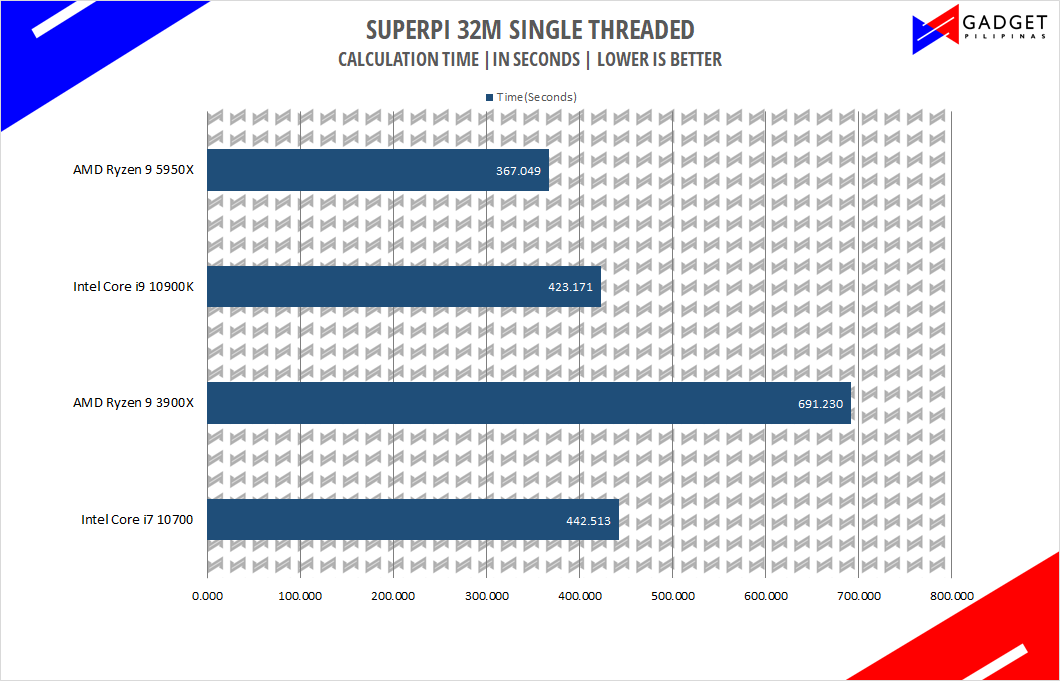 SuperPI is a single-threaded benchmark application that lets the CPU calculate Pi(π) to the nth digit. In this benchmark, we selected the Pi calculation to 32M, the highest available for the app.
SuperPI is a single-threaded benchmark application that lets the CPU calculate Pi(π) to the nth digit. In this benchmark, we selected the Pi calculation to 32M, the highest available for the app.
wPrime 1024M
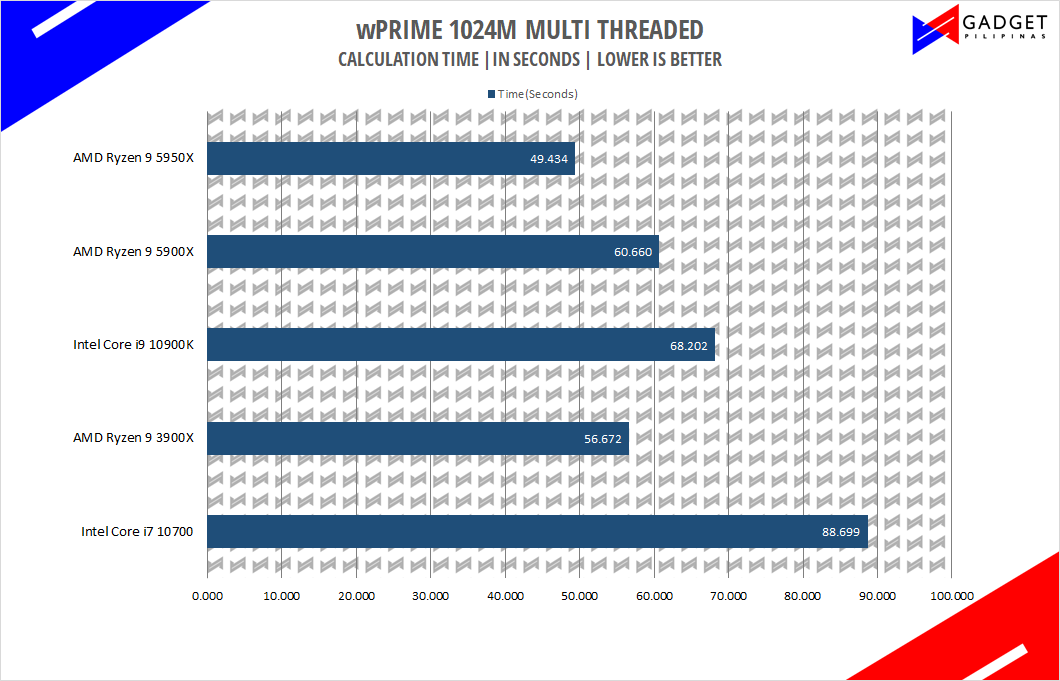 wPrime is a benchmark tool similar to SuperPI, but the former takes on finding prime numbers using Newton’s Method. The benchmark is set to calculate 1024M, and measured according to calculation time.
wPrime is a benchmark tool similar to SuperPI, but the former takes on finding prime numbers using Newton’s Method. The benchmark is set to calculate 1024M, and measured according to calculation time.
AIDA64
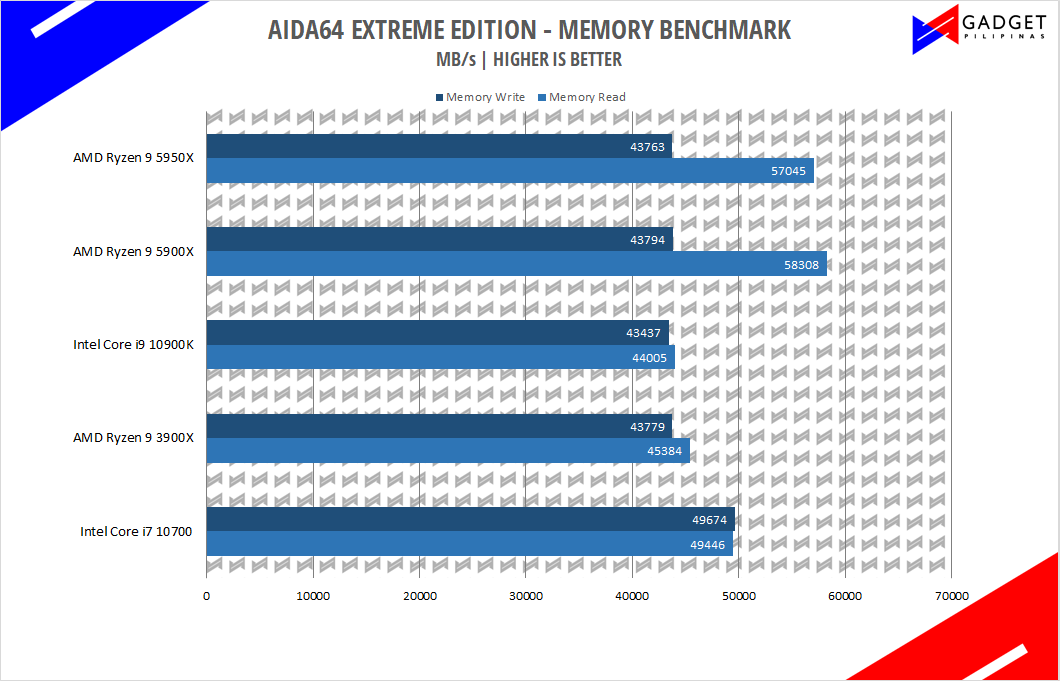 AIDA64 is a very popular and powerful monitoring tool, as well as a benchmarking application. AIDA64 is commonly used to stress test CPUs, especially testing if an overclock is stable. We used AIDA64’s Memory Benchmark to measure the data transfer bandwidth of the system memory.
AIDA64 is a very popular and powerful monitoring tool, as well as a benchmarking application. AIDA64 is commonly used to stress test CPUs, especially testing if an overclock is stable. We used AIDA64’s Memory Benchmark to measure the data transfer bandwidth of the system memory.
GeekBench 5
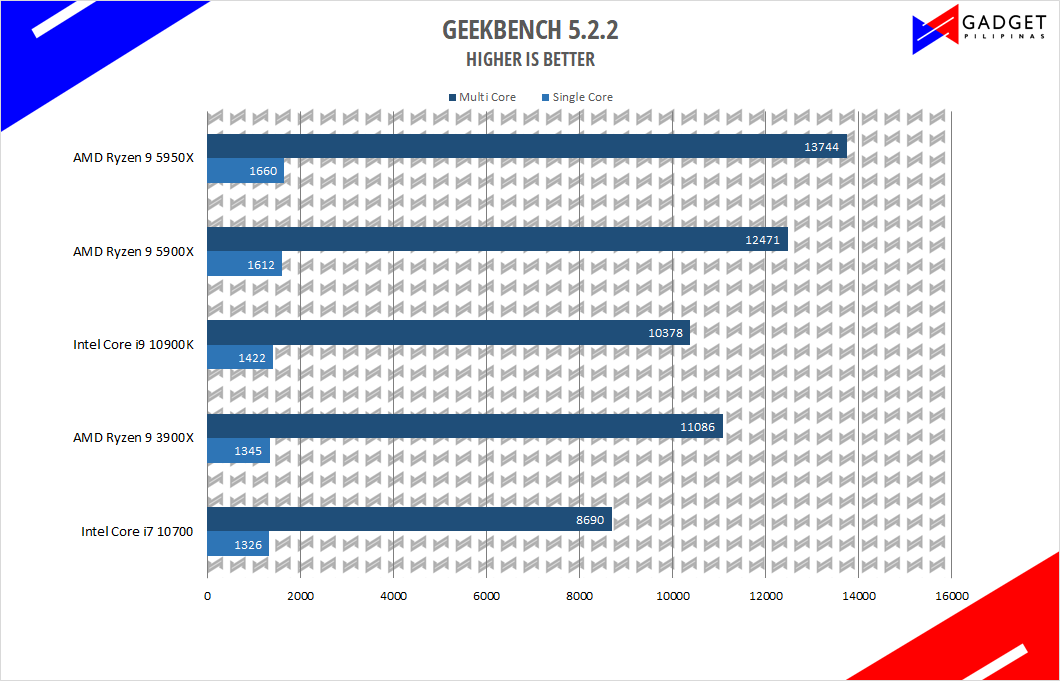 Geekbench is a multi-platform benchmark that’s used to gauge CPU performance and compare them across Windows, Mac, and Mobile. Geekbench 5 is the latest version and doesn’t rely on memory as much compared to the previous Geekbench 4, making it a great tool to measure both single-core and multi-core CPU performance.
Geekbench is a multi-platform benchmark that’s used to gauge CPU performance and compare them across Windows, Mac, and Mobile. Geekbench 5 is the latest version and doesn’t rely on memory as much compared to the previous Geekbench 4, making it a great tool to measure both single-core and multi-core CPU performance.
CINEBENCH R20
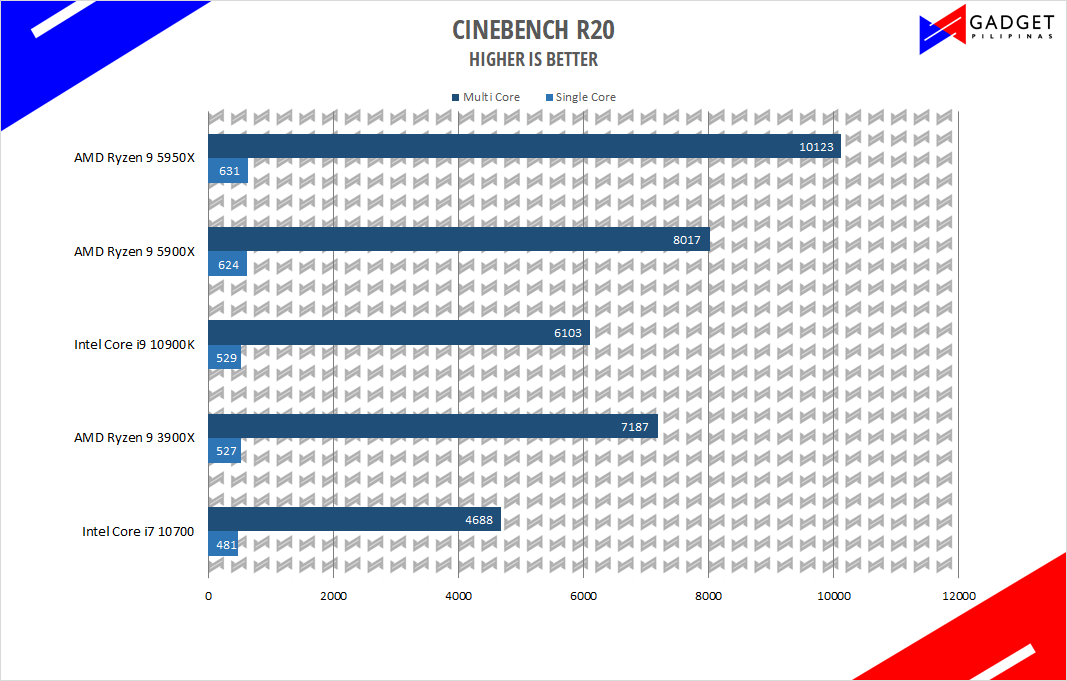 Maxon’s Cinebench benchmark is one of the most iconic benchmark applications used by reviewers and enthusiasts. The latest Cinebench R20 uses the latest rendering architectures, including Intel’s Embree ray tracing technology and other advanced features from AMD and Intel that allows users to render the same scene on the same hard. Cinebench R20 uses a larger and more complex testing scene than Cinebench R20 by about 8x computational power and requires 4x the memory.
Maxon’s Cinebench benchmark is one of the most iconic benchmark applications used by reviewers and enthusiasts. The latest Cinebench R20 uses the latest rendering architectures, including Intel’s Embree ray tracing technology and other advanced features from AMD and Intel that allows users to render the same scene on the same hard. Cinebench R20 uses a larger and more complex testing scene than Cinebench R20 by about 8x computational power and requires 4x the memory.
GOOGLE OCTANE 2.0
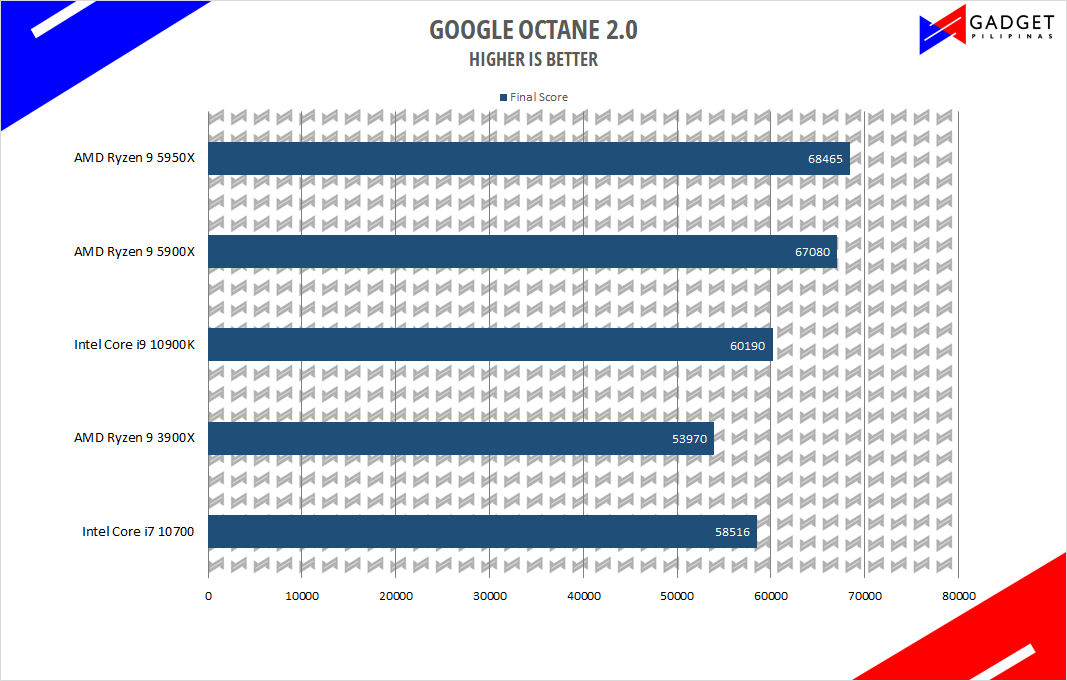 Google Octane 2.0 is a benchmark that measures a Javascript engine’s performance by running multiple tests representing different use cases of JavaScript applications. While Google Octane is retired and no longer maintained, it is still a good representation of today’s dynamic, interactive web applications. Our Google Octane 2.0 is run on Microsoft’s latest Chromium-based Edge browser.
Google Octane 2.0 is a benchmark that measures a Javascript engine’s performance by running multiple tests representing different use cases of JavaScript applications. While Google Octane is retired and no longer maintained, it is still a good representation of today’s dynamic, interactive web applications. Our Google Octane 2.0 is run on Microsoft’s latest Chromium-based Edge browser.
V-RAY
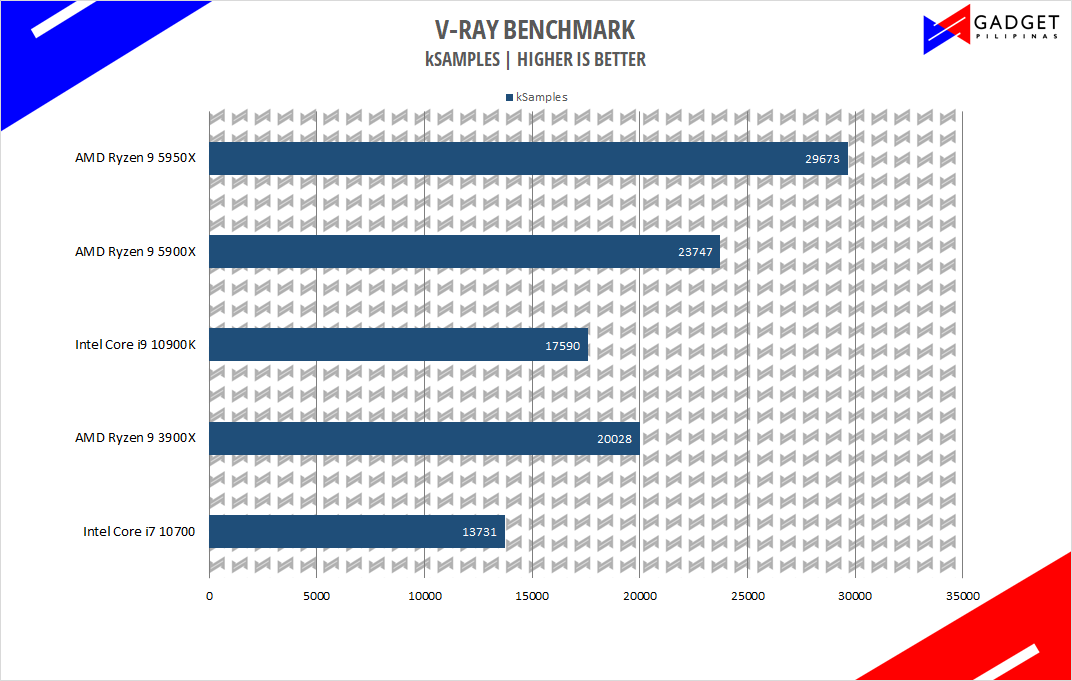 V-Ray Benchmark is a stand-alone version V-Ray developed by Chaos Group. It is designed to test the CPU and GPU by rendering sample scenes at a fixed amount of time. V-Ray is a plug-in mostly utilized by 3D computer graphics software applications mainly for industrial design, product design, architecture, film, and video game production. V-Ray is not limited to 64-threads as it supports multi and mega-threading.
V-Ray Benchmark is a stand-alone version V-Ray developed by Chaos Group. It is designed to test the CPU and GPU by rendering sample scenes at a fixed amount of time. V-Ray is a plug-in mostly utilized by 3D computer graphics software applications mainly for industrial design, product design, architecture, film, and video game production. V-Ray is not limited to 64-threads as it supports multi and mega-threading.
BLENDER
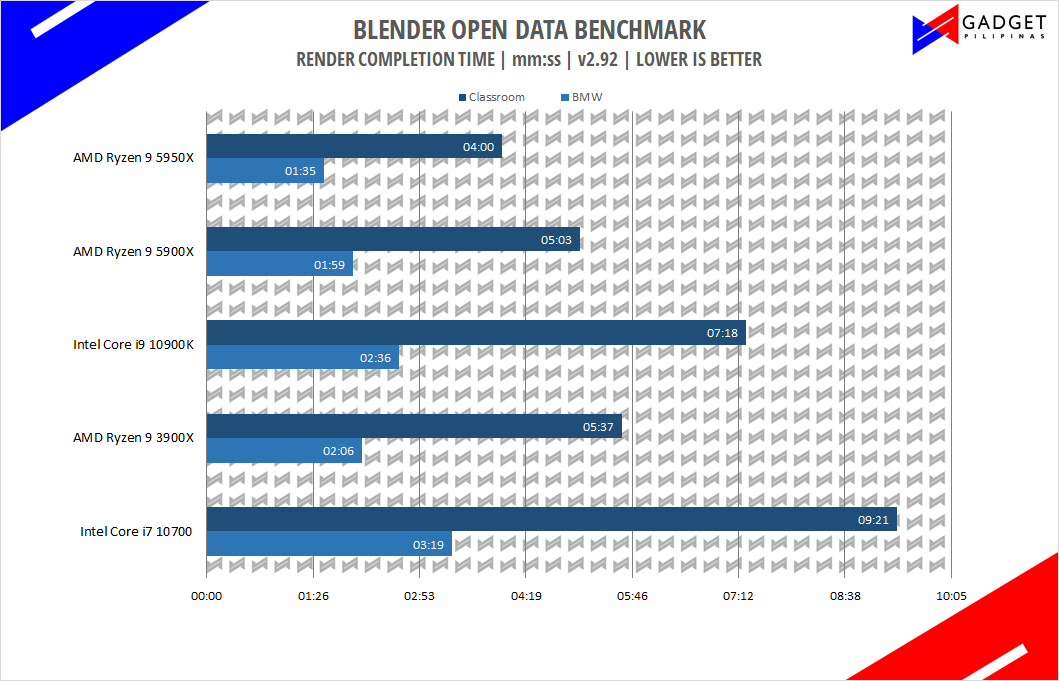 Blender is a widely used, free, open-source 3D creation suite. It supports the whole 3D pipeline process from modeling, rigging, animation, simulation, rendering, and even motion tracking. Blender has become a standard for CPU benchmarks with the BMW27 and Classroom scene most used. This prompted the company to release Blender Open Data Benchmark in 2018, a benchmark-specific version that allows users to run a preset benchmark and share the results online similar to 3D Mark.
Blender is a widely used, free, open-source 3D creation suite. It supports the whole 3D pipeline process from modeling, rigging, animation, simulation, rendering, and even motion tracking. Blender has become a standard for CPU benchmarks with the BMW27 and Classroom scene most used. This prompted the company to release Blender Open Data Benchmark in 2018, a benchmark-specific version that allows users to run a preset benchmark and share the results online similar to 3D Mark.
CORONA RENDERER
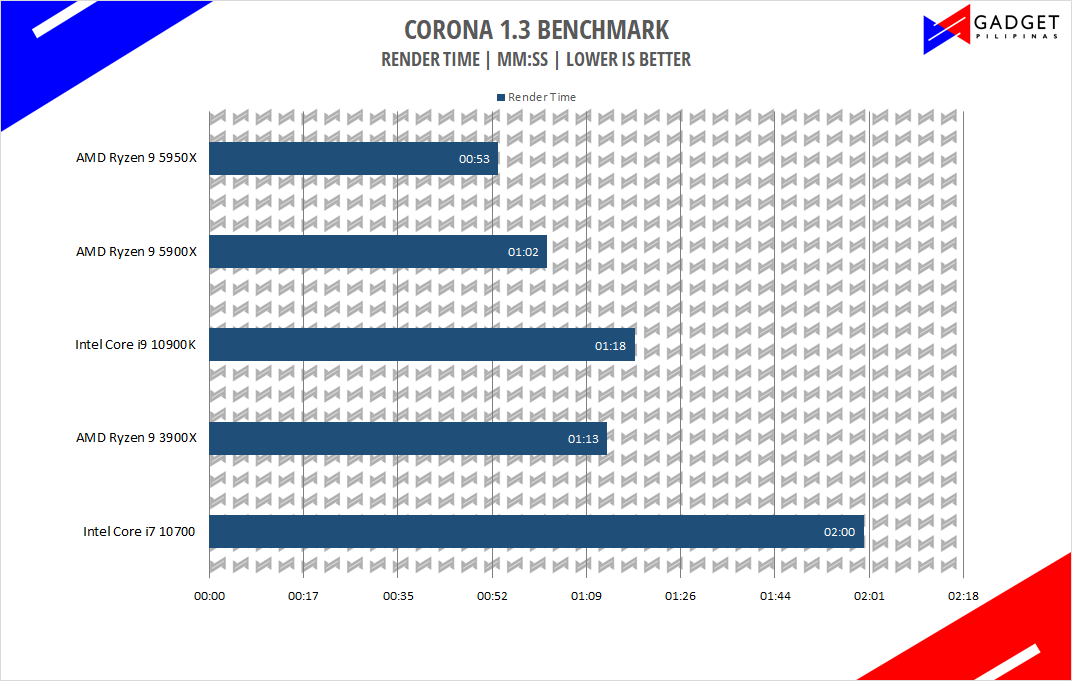 Corona Renderer is an unbiased photorealistic render available for Autodesk 3Ds Max, Maxon Cinema 4D, and as a stand-alone application. Its popularity, similar to Blender, led Chaos Group to develop a benchmark version of the app which runs using Corona Renderer 1.3. Workstation systems, especially CPUs, can utilize Corona Benchmark as up to 72 threads can be used in the benchmark, making it very suitable for CPUs with various price segments.
Corona Renderer is an unbiased photorealistic render available for Autodesk 3Ds Max, Maxon Cinema 4D, and as a stand-alone application. Its popularity, similar to Blender, led Chaos Group to develop a benchmark version of the app which runs using Corona Renderer 1.3. Workstation systems, especially CPUs, can utilize Corona Benchmark as up to 72 threads can be used in the benchmark, making it very suitable for CPUs with various price segments.
Intel Core i7 10700 Gaming Benchmarks
3DMARK
3DMark is the go-to benchmark for gamers because of the ability to share and compare results online. We used Time Spy DirectX 12 benchmark and Fire Strike DirectX 11 benchmark to gauge the CPU’s performance using different APIs.
DOTA 2
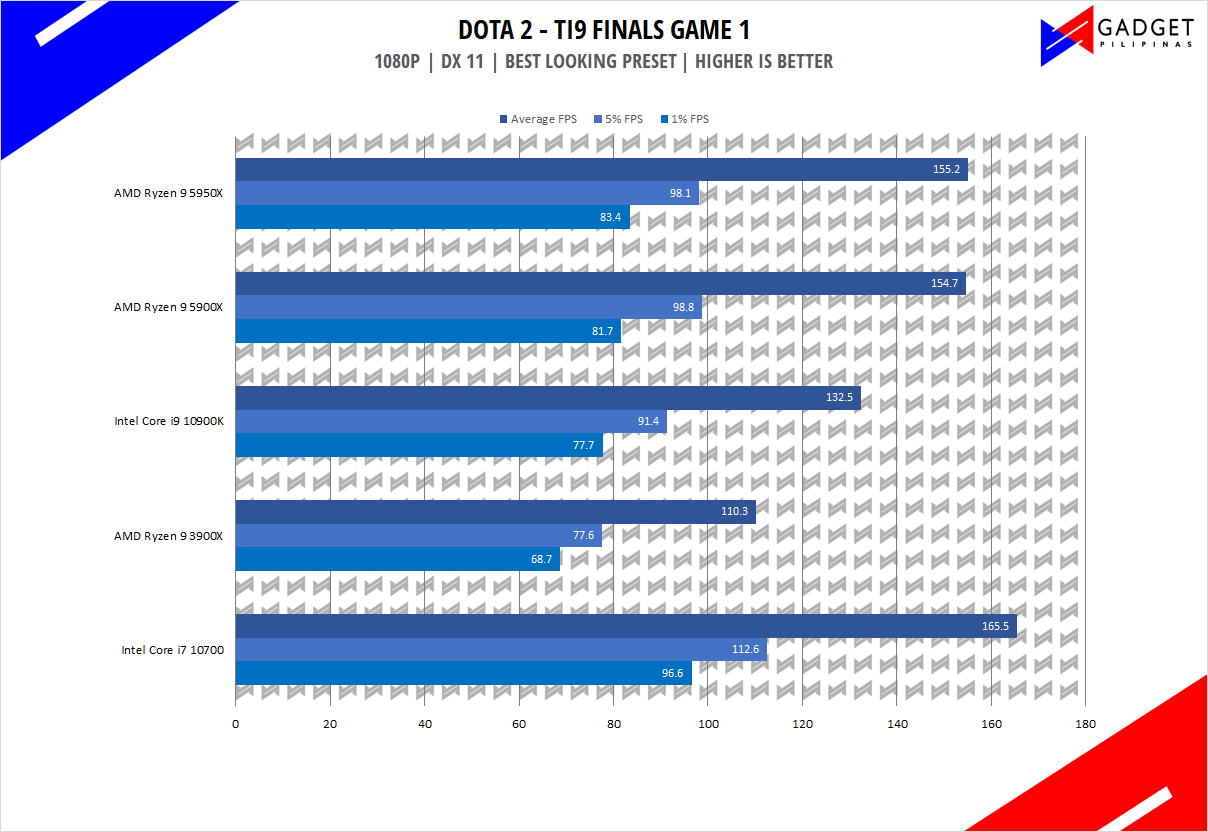 Most gamers play at least one of the following free-to-play titles: League of Legends, CS: GO, Dota 2, and/or Fortnite. Dota 2 is a good representation of the F2P titles as it is the most demanding game in the spectrum. The benchmark will give you an idea of the laptop’s relative performance on other lesser demanding titles. Our benchmark sequence is based on a replay of OG vs. Liquid in the TI9 grand finals from the team fight that happened on 28:30 to 29:30.
Most gamers play at least one of the following free-to-play titles: League of Legends, CS: GO, Dota 2, and/or Fortnite. Dota 2 is a good representation of the F2P titles as it is the most demanding game in the spectrum. The benchmark will give you an idea of the laptop’s relative performance on other lesser demanding titles. Our benchmark sequence is based on a replay of OG vs. Liquid in the TI9 grand finals from the team fight that happened on 28:30 to 29:30.
Far Cry 5
FarCry 5 is an FPS game published by Ubisoft and uses the Dunia engine. It heavily relies on and takes advantage of DirectX 11 to render a realistic environment that makes it taxing to both the CPU and GPU.
Rainbow Six Siege
Rainbow Six Seige is one of the few popular AAA games that’s still popular in 2019 due to its competitive gameplay mechanics. R6S uses the AnvilNext game engine, which is developed by the game’s publisher, Ubisoft. As of writing, Rainbow Six Siege is currently the most popular Tom Clancy title beating out Wildlands, Breakpoint and even, Division 2.
Metro Exodus
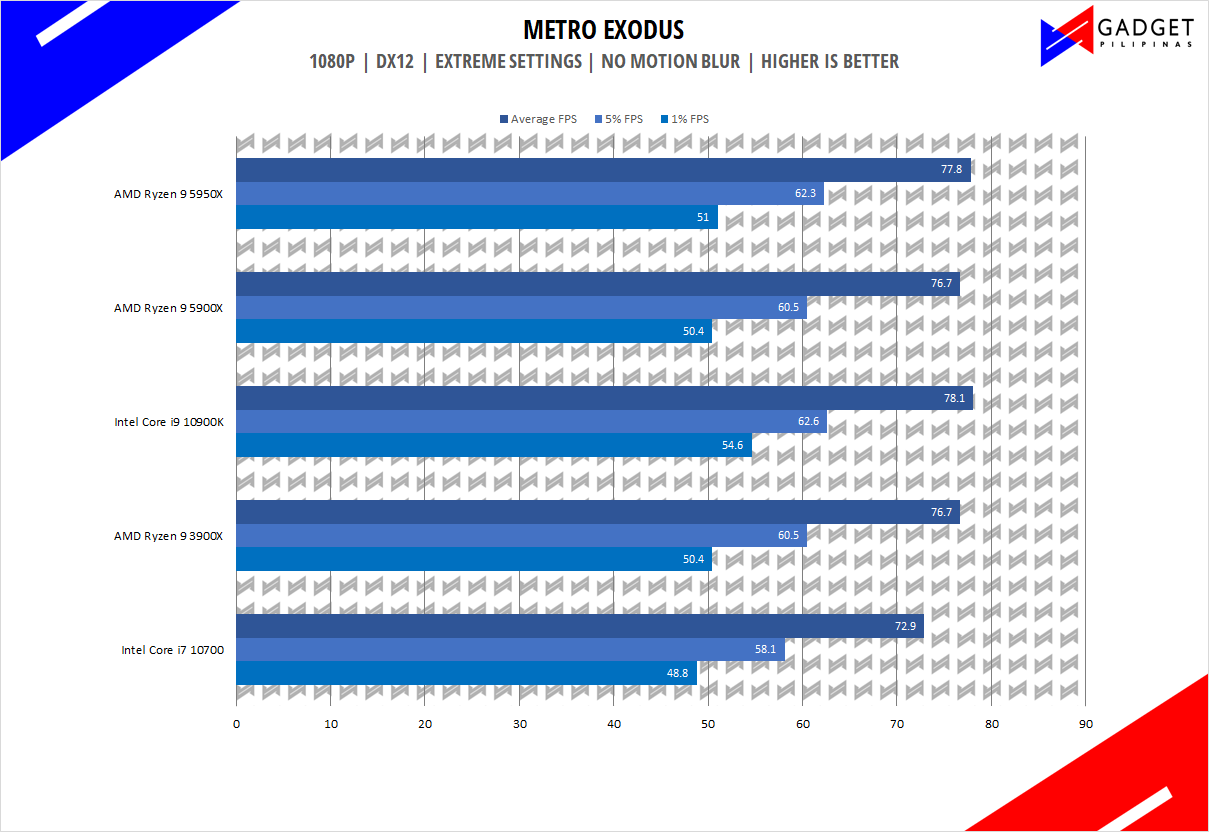 Metro Exodus is the third Metro game trilogy based on Dmitry Glukhovsky’s novels. The game is a first-person shooter with survival horror and stealth elements. The post-apocalyptic game is using 4A Engine by 4A games. Released last 2019, Metro Exodus remains to be one of the most graphically pleasing and demanding games that’s popular to date.
Metro Exodus is the third Metro game trilogy based on Dmitry Glukhovsky’s novels. The game is a first-person shooter with survival horror and stealth elements. The post-apocalyptic game is using 4A Engine by 4A games. Released last 2019, Metro Exodus remains to be one of the most graphically pleasing and demanding games that’s popular to date.
Assassin’s Creed: Odyssey
Assassin’s Creed Odyssey is the latest franchise installment from Ubisoft. It’s by far the most popular and stable Assassin’s Creed title since AC IV: Black Flag. It uses the AnvilNext 2.0 game engine, an updated version of Rainbow Six Siege’s game engine, and uses the DirectX 12 API.
F1 2020
F1 2020 is the official video game of the 2020 Formula 1 and Formula 2 championships developed by Codemasters. F1 2020 is the twelfth installment in the franchise and uses the Ego Engine 3.0. F1 2020 is a good representation of racing games thanks to its realistic graphics and fairly demanding spec requirements.
Anno 1800
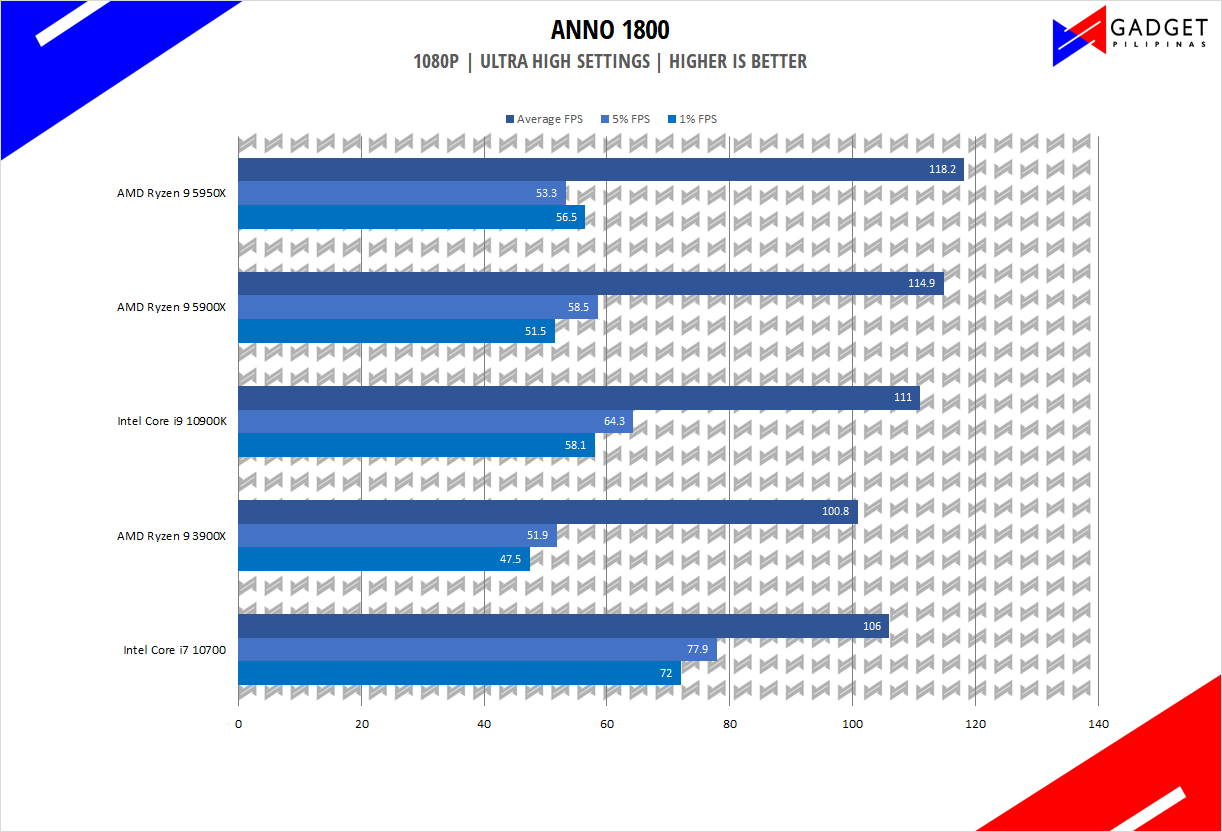 Anno 1800 is one of the most popular RTS games next to seasoned classics such as StarCraft 2, Red Alert, and Civilization V. Anno 1800 uses an improved Anno Engine version previously used by previous titles. It’s one of the latest RTS games (as of writing) with impressive graphics, making it a great representation for RTS and City-building games.
Anno 1800 is one of the most popular RTS games next to seasoned classics such as StarCraft 2, Red Alert, and Civilization V. Anno 1800 uses an improved Anno Engine version previously used by previous titles. It’s one of the latest RTS games (as of writing) with impressive graphics, making it a great representation for RTS and City-building games.
Intel Core i7 10700 Temps
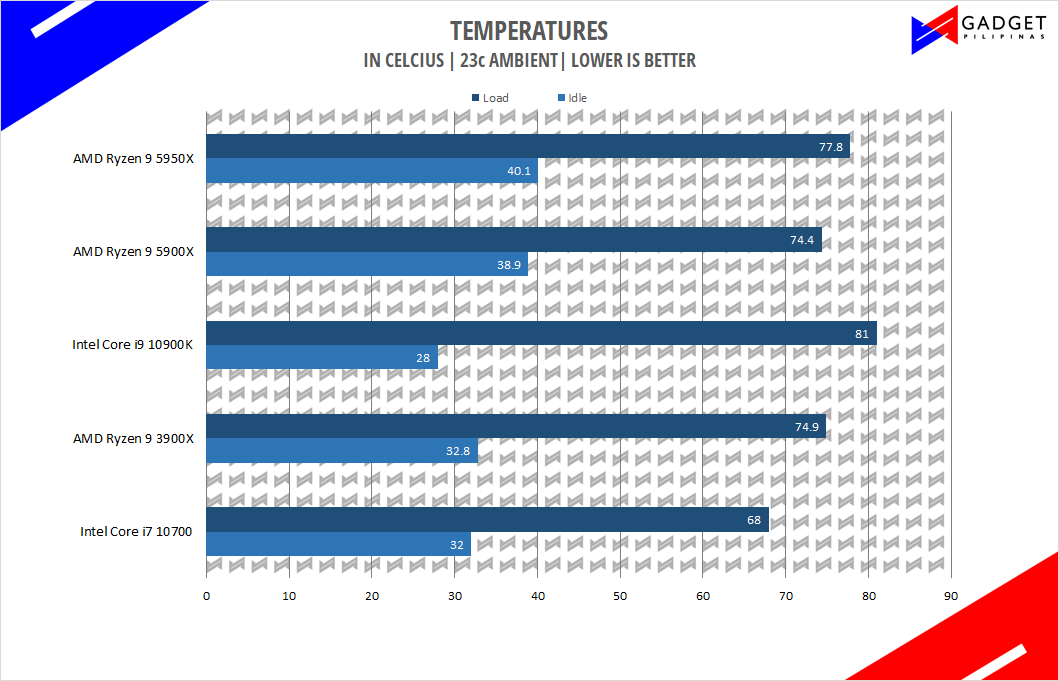 One of the main advantages of being a locked processor is its incredibly low TDP which results in lower temperatures. The Intel Core i7 10700 peaks at 68°c on our 240mm AIO. Running the i7 10700 on the included stock cooler should pose no thermal issues that would degrade the CPU’s performance. That said, there’s the i7 10700 doesn’t require heavy-cooling as it only has a 65w-TDP.
One of the main advantages of being a locked processor is its incredibly low TDP which results in lower temperatures. The Intel Core i7 10700 peaks at 68°c on our 240mm AIO. Running the i7 10700 on the included stock cooler should pose no thermal issues that would degrade the CPU’s performance. That said, there’s the i7 10700 doesn’t require heavy-cooling as it only has a 65w-TDP.
Conclusion
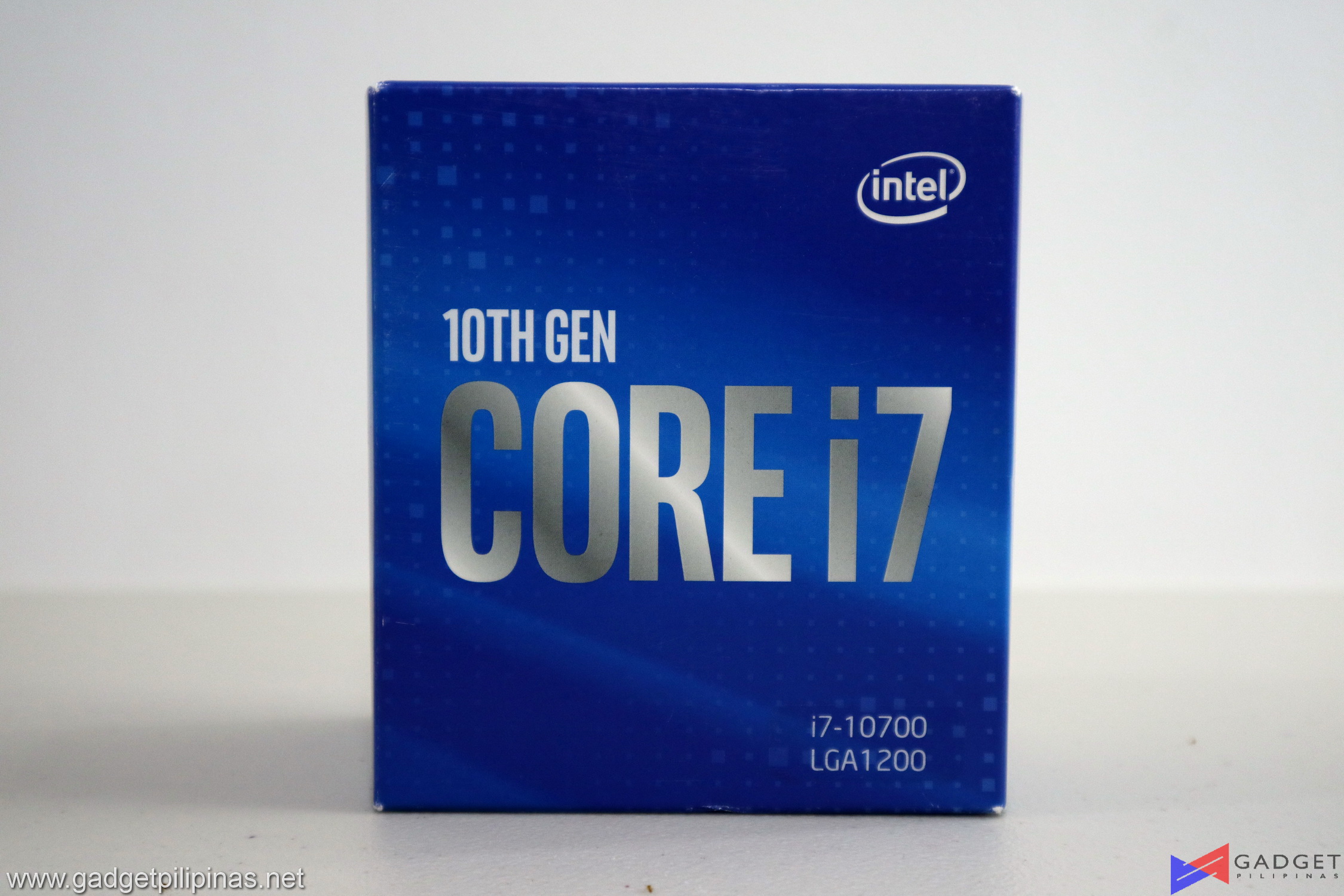 The Intel Core i7-10700 performs admirably in gaming as it hits FPS numbers close to the Intel Core i9 10900K which has higher clock speeds, two more cores, and is overclockable, and is priced almost double the Core i7 10700. Intel has managed to balance compromises in terms of performance and pricing on the i7 10700 which makes it still a viable processor despite being a generation old considering how it can keep up even with the Nvidia RTX 3070. However, as seen in our benchmarks, for more efficient productivity, you may be better off with the 10900K. Although it’s worth mentioning that it still gets the job done, especially if you rarely do video editing here and there – it’s a processor that’s still intended for gaming.
The Intel Core i7-10700 performs admirably in gaming as it hits FPS numbers close to the Intel Core i9 10900K which has higher clock speeds, two more cores, and is overclockable, and is priced almost double the Core i7 10700. Intel has managed to balance compromises in terms of performance and pricing on the i7 10700 which makes it still a viable processor despite being a generation old considering how it can keep up even with the Nvidia RTX 3070. However, as seen in our benchmarks, for more efficient productivity, you may be better off with the 10900K. Although it’s worth mentioning that it still gets the job done, especially if you rarely do video editing here and there – it’s a processor that’s still intended for gaming.
All in all, the Intel Core i7 10700 is a solid option for gamers who don’t want but to spend much on a CPU but desires a no-frills, plug-and-play processor that maximizes gaming performance without the need to worry about thermals. Despite being launched last 2020, the Intel Core i7 10700 has no problem in keeping up with the latest graphics card, not to mention the different render resolutions. Yes, the Php 15,000 price tag is an arguably steep price to pay for a last-gen processor, but the i7 10700 offers some savings as you don’t need a third-party cooler nor a VRM-heavy motherboard to run it.
The post Intel Core i7 10700 Review – Performance On A Budget appeared first on Gadget Pilipinas | Tech News, Reviews, Benchmarks and Build Guides.
Source: Gadget Pilipinas
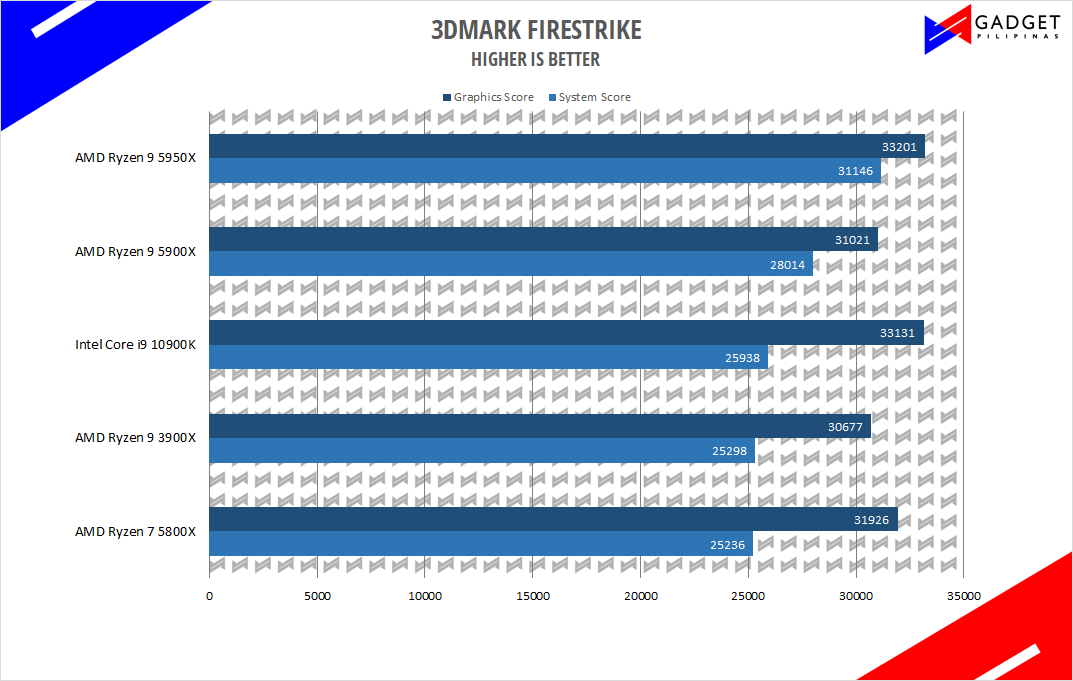
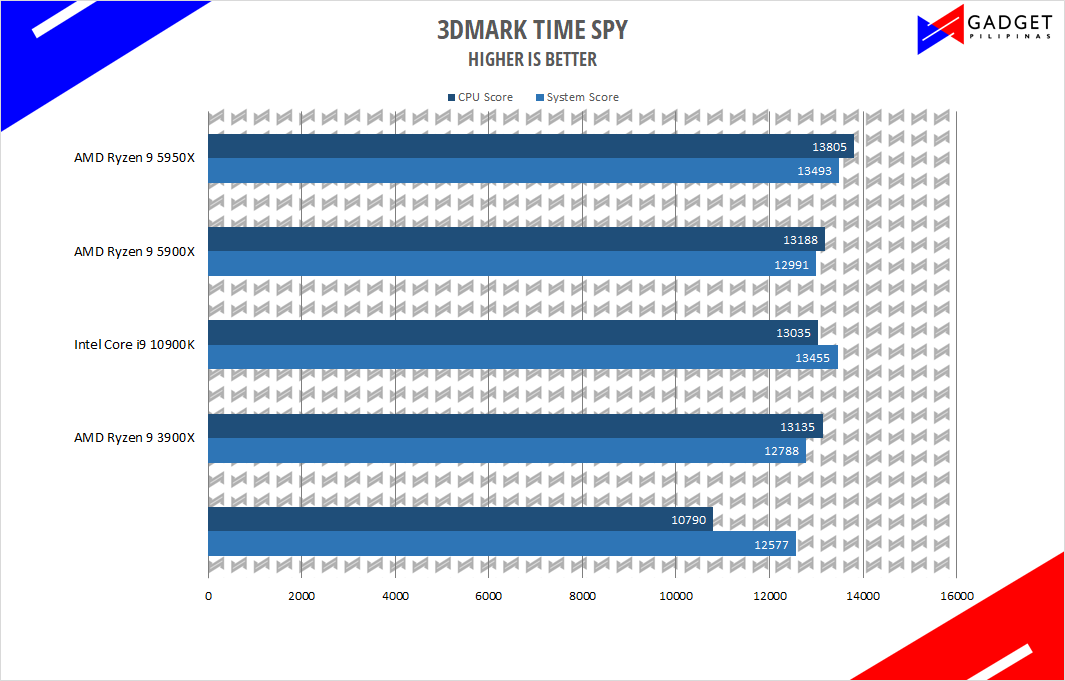
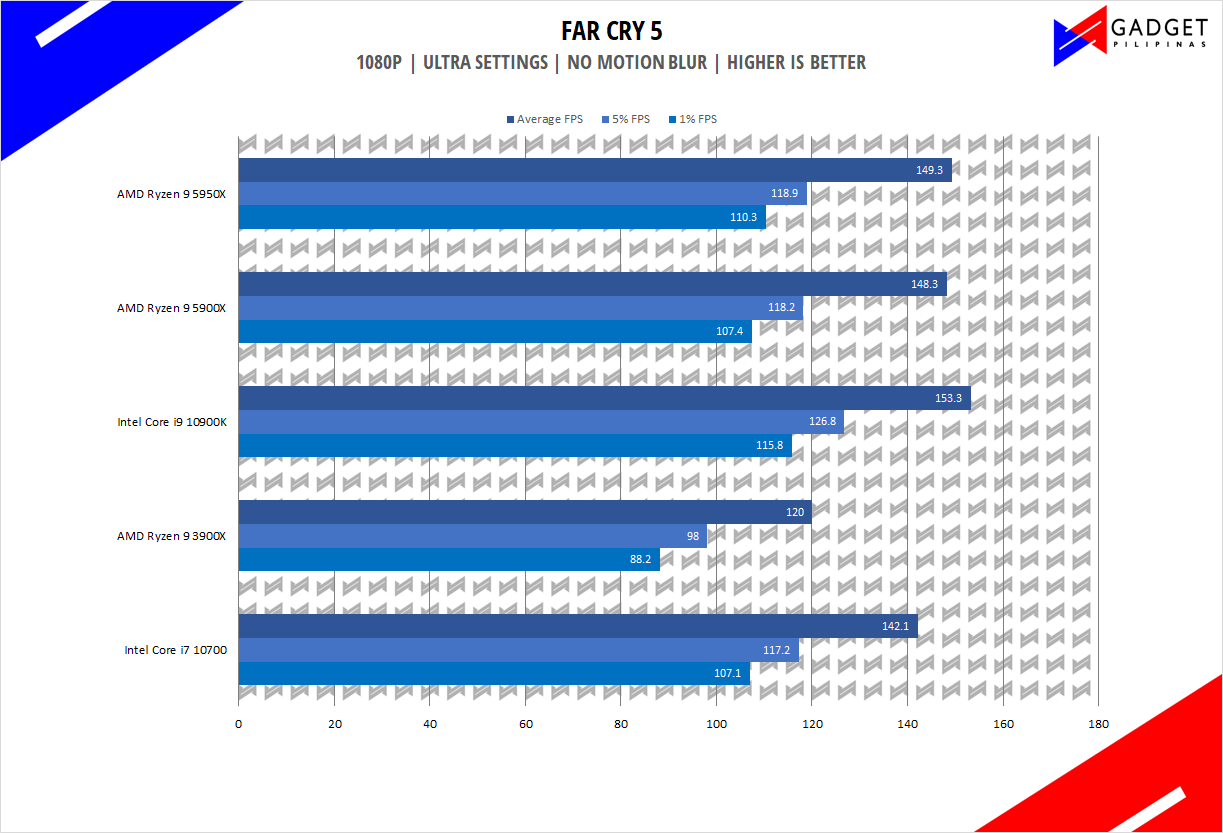
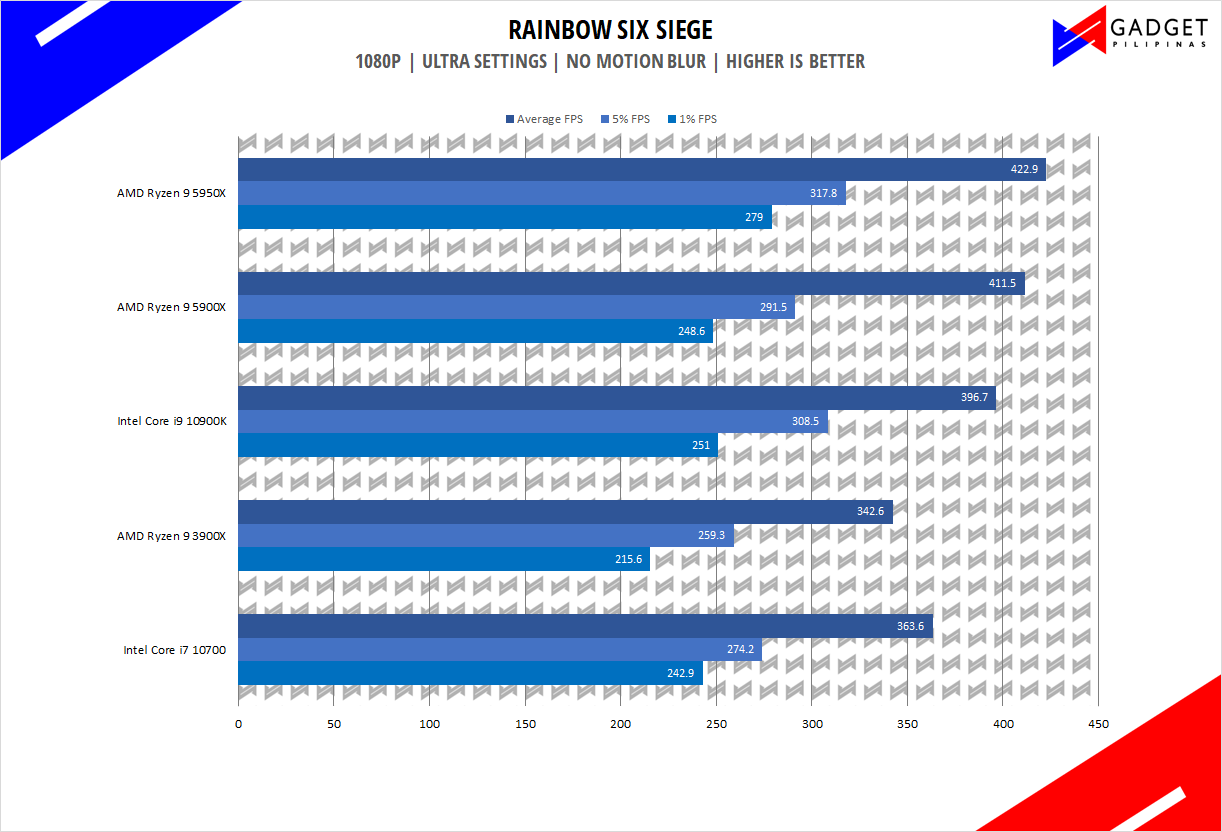
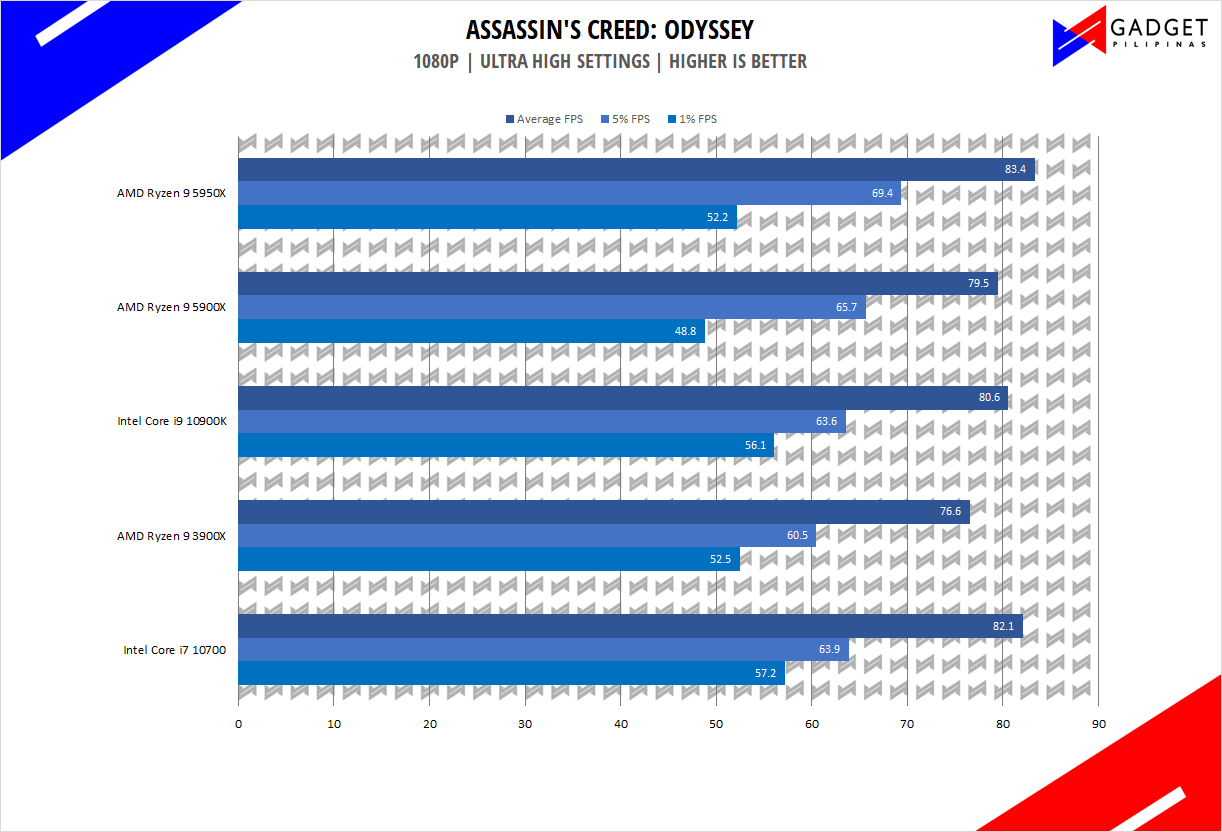
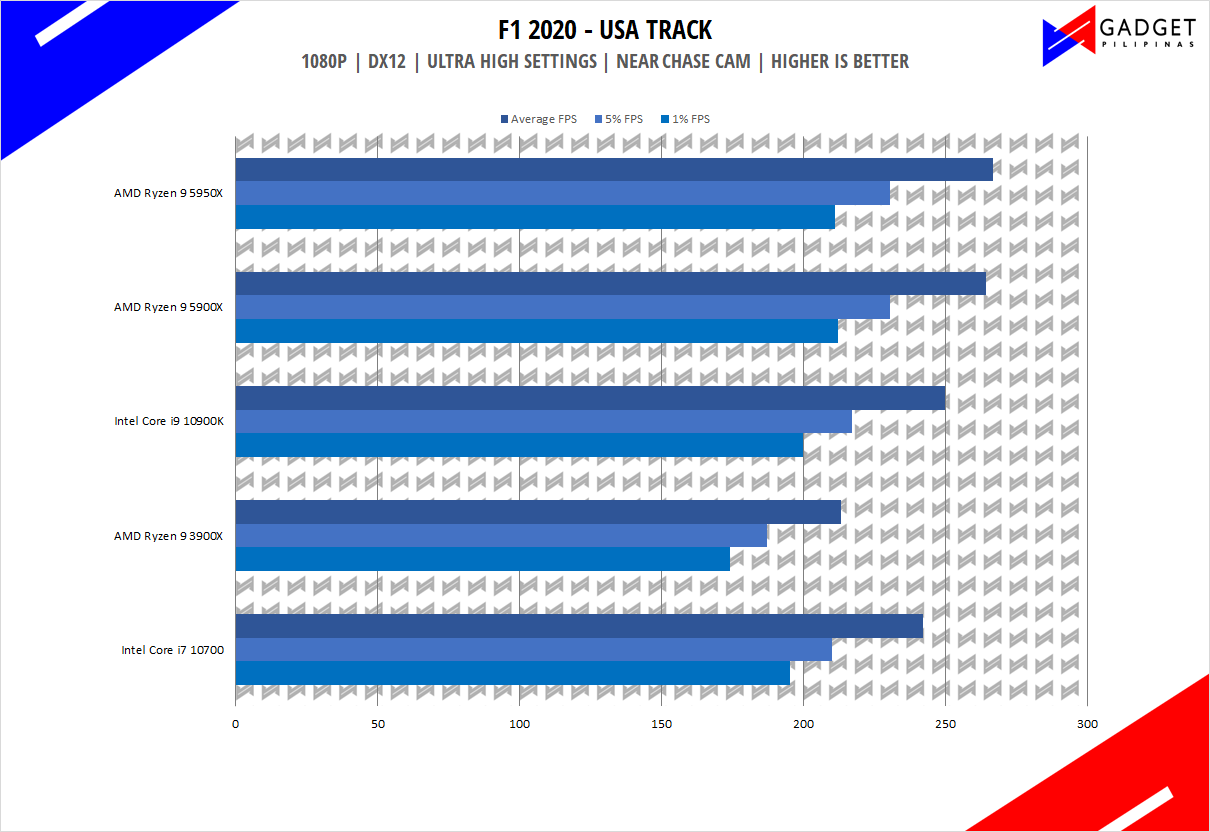

0 Comments